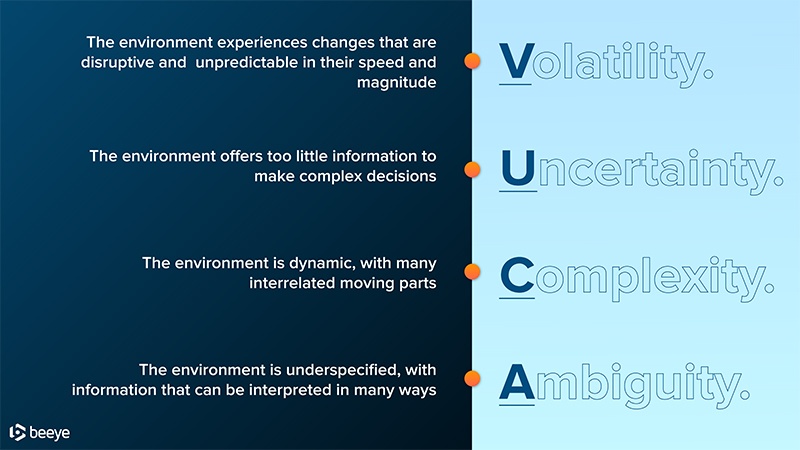We are continuing on the different tools and approaches that will help you improve your project management processes. Today, we're going to talk about VUCA, an innovative set of strategies inspired by military leadership to deal with Volatility, Uncertainty, Complexity, and Ambiguity.
VUCA has always been present in our environment and they will always remain unavoidable. The purpose of this article is to highlight the importance of VUCA to help you better understand its impact on your project management processes and why you should deal with it ASAP.
What is VUCA?
I know what you’re thinking, what on earth is VUCA?
According to Nathan Bennett and G. James Lemoine (Harvard Business Review, 2014) VUCA short for Volatility, Uncertainty, Complexity and Ambiguity is a managerial abbreviation that was coined from the United States Army War College describing the conditions resulting from the Cold War. Since then, it has been adopted by organisations in many industries to describe their most significant challenges.
Here's a video introduction to VUCA:
What does VUCA have to do with project management?
Project management is not the same it was 20 years ago. In today’s digital era, we are constantly being challenged with change and are pressured to innovate. Competition keeps getting fiercer, resources are becoming scarcer and customers are more demanding than ever.
The way the world is - volatile, uncertain, complex and ambiguous - has really impacted the way project management is being carried out. It makes it difficult for project managers to make informed decisions, efficiently plan, easily adapt to change and find solutions to problems.
Why should I pay attention to it?
VUCA shines as a framework that will help you :
- Anticipate hard to detect issues ("unknown unknowns")
- Understand the consequences of issues and actions
- Appreciate the interdependence of variables
- Prepare for alternative realities and challenges
- Interpret and address relevant opportunities
Now that you’ve learned about VUCA and its importance, here’s a deeper meaning of each component.

Volatility
This refers to the unpredictability, speed and magnitude of change. Operating in a volatile environment is being subject to frequent, rapid and significant challenges that are going to disrupt your plans and day-to-day activities. These challenges emerge out of the blue and are of unknown duration.
Volatility increases your inability to differentiate between urgency and importance, which delays the execution of your activities making it very difficult for you to reach your goals.
Uncertainty
This refers to our inability to predict events and their outcomes. Uncertainty is the result of operating in volatile environments, because no one knows when these changes or challenges are going to occur. Essentially, uncertainty implies lack of knowledge or information, such as our inability to determine the course of future events.
To get a better idea, you can ask yourself this question “How much do I about the situation?”
Complexity
This refers to the number of components and the relationships between these components in a system and their degree of dependency.
Complexity is characterized as “a situation that has many interconnected parts and variables. Some information is available or can be predicted, but the volume or nature of it can be overwhelming to process”. This makes it impossible to predict the outcome of an action or decision.
Ambiguity
This refers to the degree to which situations, information and events can be interpreted in many different ways. Ambiguity causes mixed messages, conflicts of interests and the inability to understand a situation. Operating in this atmosphere makes it difficult to achieve consensus and reach your objectives.
⁂